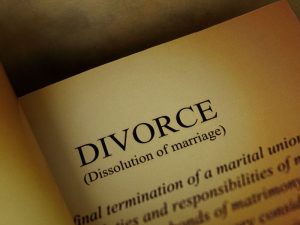
When should I hire a Divorce Lawyer?
 Sometimes married couples who plan on getting divorced think it’s a good idea to settle-up with a spouse and then retain a lawyer to draw up the necessary paperwork.
Sometimes married couples who plan on getting divorced think it’s a good idea to settle-up with a spouse and then retain a lawyer to draw up the necessary paperwork.
Clearly, it’s preferable to be reasonable and proceed in good faith in dealing with your spouse, particularly in instances where the marriage has fallen apart but the respective parties still care for one another.
Marriage offers an economy of scale that extends beyond just tax rates, deductions, and claiming eligible dependents.
Legal Separation and dividing a household often involve substantially increased living expenses.
Establishing and maintaining two separate households on the same income, especially when children are involved, can result in expenses that are in fact more than doubled.
It’s therefore understandable some might think they’re saving money by “working things out” in advance without the participation of legal counsel.
We understand short-term cash flow may be an issue.
At the same time, you worked hard for your house, retirement, 401K, and other personal and marital assets.
You should protect them.
Getting divorced is a major life event.
While an attorney is not required to prepare a Separation Agreement or to even file for divorce in North Carolina, once certain documents are executed and/or filed, some mistakes cannot be fixed – Bill Powers
If you don’t know what QDRO stands for (qualified domestic relations order) or what happens if you fail to timely allege a claim for Equitable Distribution, we urge you to consult with an experienced divorce lawyer in Charlotte.
I did some research on Google
The Internet can be a helpful source of information, at least during the formative stages of a divorce.
If nothing else, on-line research can get you up-to-speed on some of the important terms and general precepts of getting divorced in North Carolina.
Unfortunately, there is a tremendous amount of either misleading or incorrect “free advice” out there.
It is our considered opinion that self-help forums and purportedly “simple online divorce forms” involving post-separation support, child custody agreements, alimony, and Equitable Distribution are problematic at best.
Indeed, executing (signing) some agreements without the advice of a lawyer can have long term, negative, and irrevocable consequences.
It’s imperative to have a thorough understanding of your assets and the true value of the “marital estate.”
That often necessitates a review of bank records, real property valuation(s), mortgages, taxes, and the NC Child Support Guidelines before negotiating or agreeing to terms of separation.
Marriage by its very nature involves a comingling of assets.
Separating and distributing assets, hopefully without harming or reducing their value or incurring substantial financial penalties, can be a challenging if not vexing process.
We believe good decisions are predicated on having accurate, complete information.
That applies to both financial records and protecting your individual legal rights.
Some people tell their spouse, “I want a divorce,” not fully understanding the full range of consequences and how truly complicated determining child visitation, support, and distribution of assets can be.
“The financial aspects of ending a marriage are a common source of conflict and can be as troublesome as settling any hotly contested dispute in court – Bill Powers, Mecklenburg Divorce Lawyer
Before doing anything, perhaps even before telling your spouse you want a divorce, we think it’s important to fully understand your legal rights relative to your particular marriage.
You and your marriage are unique
Contrary to what some might think, one size does not fit all.
That is especially true regarding divorce in North Carolina.
Marital circumstances are rarely exactly the same from one marital relationship to another.
If that weren’t the case, it wouldn’t matter who you married.
What is important to you, how you raise your family, your faith, spending habits, and where you live might not mean a hill of beans to anyone else besides you.
That might even be true for your spouse.
There are reasons people get divorced.
As such, the advice of friends and family, as well-meaning as it may be, is all too often inapplicable to your individual matter, your financial condition, your personal concerns, needs, and circumstances.
It also may be flat out wrong and directly contrary to the divorce laws in North Carolina.
Even close friends and family often do not fully share the intricacies, difficulties, and nuances of their marriages.
Suffice it to say, some things better go unsaid.
Experience shows, those “embarrassing” and “unsaid” issues can be the reason for the divorce in the first place and possibly a point of contention in the future.
Friends and family also may feel it more important to support you and your feelings, rather than be brutally honest regarding certain issues and human frailties.
They also may not have all the facts or a full understanding of what the law is, rather than what they think it is or should be.
One of the benefits of the attorney-client privilege allows for complete disclosure of all the facts and circumstances of a divorce.
“You should tell your divorce lawyer the whole truth, even if it might be a bit embarrassing. Our job is to provide sound legal advice, not to judge you” – Bill Powers
Legal Reference Materials: Separation, Support, Custody, and Divorce
- What does Absolute Divorce mean?
- What does Joint Custody mean?
- What am I entitled to in a Divorce?
- How long does it take to get Divorced in North Carolina?
- Child Custody and Visitation During the Coronavirus
- NC Divorce Laws

Divorce Day
 Nationwide, January 6, 2020 has been informally designated as “Divorce Day.” Charlotte divorce lawyers anticipate a sharp increase in call volume immediately following the holidays.
Nationwide, January 6, 2020 has been informally designated as “Divorce Day.” Charlotte divorce lawyers anticipate a sharp increase in call volume immediately following the holidays.
While it may be popular to call it “Divorce Day,” in North Carolina, it might be better entitled, “Divorce Year.”
In part that is because the NC divorce laws, with certain exceptions, ordinarily mandate a minimum period of separation of 12 months before filing for divorce is authorized under the law.
Filing for divorce tends to slow down before Thanksgiving. Planning for separation and divorce spikes at the beginning of every new year – Bill Powers, Charlotte Divorce Lawyer
There are important legal filings and contractual agreements in the period leading up to the formal entry of a divorce order.
That may include things like:
- Post Separation Support (formerly referred to as temporary alimony)
- Child Custody
- Child Support
- Separation Agreement
- Living Arrangements
- Asset valuation
- Equitable Distribution
- Transfer of Real Property and Marital Assets
Separating a marital estate can be complicated.
Even with the most modest of assets, it tends to be a time-consuming process.
What is the first step to getting divorced?
That’s a great question and one we wish more people would ask themselves before taking certain actions.
Unless there is some sort of abusive behavior necessitating the institution of safety measures or a 50B protective order, we generally do not recommend packing up and moving out. There are important legal rights relative to divorce that deserve careful consideration before action – Bill Powers, Divorce Attorney
We strongly recommend you speak with an attorney before doing anything. Timing and preparation can be key.
It also may prove to be a better financial decision to proceed with caution, gathering important documentation and information before saying, “I want a divorce.”
There are generally consequences to actions in family law cases. Prior to making any major, life-changing decision, we recommend you speak to one of our Charlotte divorce lawyers.
Whether it is our law firm or another located in Mecklenburg County, proceeding in haste can make the process unnecessarily expensive, adversarial, and emotionally taxing.
How much do lawyers cost for divorce?
Retaining a divorce attorney in Charlotte may be a bit different from your prior experiences with lawyers.
First, unlike traffic ticket lawyers or attorneys who handle minor criminal charges, there often is an initial consultation fee.
Divorce lawyers in Mecklenburg County (at least at our law office, the Powers Law Firm PA) bill hourly.
Some attorneys also require some sort of retainer. That may involve something called a True Retainer to reserve their legal services. A True Retainer is earned immediately and is not billed against.
A true retainer is paid to ensure the availability of the divorce lawyer. It also may serve to prevent legal representation to an adverse party in the separation and divorce.
Legal fees predicated on hourly work, as earned, are separate and apart from the True Retainer.
Other law firms require a retainer to be held in trust, from which legal fees are billed on a periodic basis.
At Powers Law Firm we charge:
- Initial Consultation
- True Retainer
- Hourly Rates billed weekly and/or bi-weekly
We accept credit cards, personal checks, and other traditional forms of payment. We prefer not to hold funds in trust, instead billing clients after work is performed.
We also prefer to put everything in writing. We want to make sure clients fully understand what is and what is not included in legal representation.
We seek to be completely up front and transparent with clients about the costs of hiring a divorce lawyer. It takes time to go through the contract of representation and explaining anticipated costs – Bill Powers
Expert fees, filing fees, costs of discovery, and other expenses of litigation are not part of legal representation. We also do not charge a flat rate for legal services.
Divorce Day is a good time to start looking for a lawyer and planning, educating yourself on the true costs of getting divorced.
The attorney-client relationship
Prior to speaking with a divorce lawyer at our office, we perform a conflicts check and further confirm availability for legal representation.
We want to help, understanding separation and divorce, especially in matters involving large marital estates, children, and Equitable Distribution, is a trying process.
To be clear, we are unable to assist every person who calls our office.
Our law firm is careful in client selection, limiting the number of matters we undertake for legal representation.
That means we accept a limited number of new clients on an annual basis. We want to be able to focus on the complexity of cases, working hard to make ourselves available for consultation and regular communication.
That means we purposely limit the overall number of clients we represent.
There are some matters we may feel it better to refer an inquiry to another lawyer or law firm.
Our goal is to make clear, from the outset, how the process works and what we do to help people going through difficult times. Legal representation for a divorce is a long-term relationship. We want clients to feel comfortable with us and our professional perspectives – Bill Powers, Divorce Lawyer
Call our law office now to determine the firm’s availability and the costs of legal representation: 704-342-4357
Related Legal Issues and Topics of Interest:
- When is the Best Time to get Divorced?
- Separation and Divorce Tips
- Post Separation Support and Alimony
- I Want a Divorce
- Legal Fees
- The First Step in Divorce
- Divorce after separation
- Surviving the Holidays

Surviving the Holidays
 Surviving the holidays in a difficult marriage can be difficult at best. Despite that, legal separation and filing for divorce in Charlotte tend to decline during certain seasons.
Surviving the holidays in a difficult marriage can be difficult at best. Despite that, legal separation and filing for divorce in Charlotte tend to decline during certain seasons.
Pre-existing problems in a marriage may be exacerbated by family commitments and the hustle brought on by the time of the year.
Some parents stay married for the children, thinking to themselves, “I want to give them one more special time before moving forward.”
Those are completely reasonable feelings.
Our job as Charlotte divorce lawyers is not to convince you to separate or end the marriage.
Indeed, once advised of their legal rights, some people choose to stay married and work things out.
That’s OK with us. The key is to determine what is best for you and your family.
We believe good decision-making, like sound legal advice, is predicated on possessing good information – Bill Powers
Anticipating the end of a relationship can be bitter-sweet, if not downright hard.
That is made all the more difficult if there are uncertainties and questions about the application of the divorce laws to any given marriage.
When is the best time to file for divorce?
Frankly, there really isn’t one “best answer” to that question.
Timing can be an important consideration but it is by no means the sole or only factor to take into account.
Family law cases are as varied and different as the people involved in a marriage.
There are differing, complex issues to consider including the education of children, filing of taxes, and above all, your safety and that of loved-ones.
Without question, “surviving the holidays” does not include suffering through physical violence, sexual assault, or other criminal acts.
If you fear for your safety or that of your children, there are protective measures that may be undertaken separate and apart from the formal filing for divorce.
50B – Complaint and Motion for Domestic Violence Protective Order
Filing for divorce is often the last step in the ending a marriage in North Carolina. In large measure that is due to the mandatory period of legal separation as set forth in the NC divorce laws – Bill Powers
While we are more than willing to speak about seasons of the year, relative to planning and filing for divorce, that is to some extent putting the cart before the horse.
We believe it best to have all the facts/documentation in hand before filing any type of legal proceeding.
In complex family law matters, those involving child custody and visitation or marital estates requiring careful consideration of financial records and Equitable Distribution, the parties may agree to proceed by way of a Separation Agreement.
Collaborative Divorce may also be an option to consider. “Filings” in court (Clerk of Court) in those instances may be sporadic if not limited.
It is increasingly popular for married parties to work through the specifics of divorce privately.
Assuming there aren’t disputes over Post Separation Support or “PSS” or visitation issues, even if between contentious spouses, many issues may be handled via negotiations, the voluntary exchange of financial records, by and through legal counsel.
We do recommend potential clients begin the process of selecting a divorce lawyer as soon as possible.
Even if you would like to wait until after the holiday season to move forward, it’s a good idea to plan for that.
Lawyers, like doctors, are subject to schedules and pre-existing commitments.
Put simply, if you’d like to sit down and talk a divorce law, call now and schedule an appointment.
We also do not strictly require clients to come to our law office.
We will use secure video conferencing.
Will the judge be mad if I don’t try to work things out?
Generally speaking, the answer is, “No.”
North Carolina, with certain limited exceptions, is considered a no-fault divorce state.
That doesn’t mean Family Court Judges in Mecklenburg County prefer acrimony and/or unreasonable litigants.
That is especially true when considering the best interests of children.
We believe the better practice is to proceed in good faith, seeking equitable and fair resolutions to disputes. Litigation is expensive and frankly, at times, not merited – Bill Powers
As such, the Court does not mandate counseling and working through marital issues.
A judge is not going to try to convince anyone to remain married against their will.
It will demand the parties are honest, that they disclose all relevant records/materials associated with the marriage, and that all Court Orders are followed.
Related Legal Issues and Topics of Interest
- When is the Best Time to get Divorced?
- Separation and Divorce Tips
- Collaborative Divorce
- What is Collaborative Divorce?
- Post Separation Support and Alimony
- Reconciliation
- I Want a Divorce
- NC Divorce Laws – Chapter 50
Charlotte Divorce Lawyer Bill Powers
If you have questions about your legal options, we may be able to help.
The first step involves calling our law firm and speaking with a legal assistant.
It’s a good idea, prior to meeting, to check for conflicts and availability for legal representation. It’s also a good idea to understand the costs of a formal consultation and retention of the firm as counsel – Bill Powers
Call Bill Powers NOW: 704-342-4357
Learn More
Is a lawyer required for divorce?
 You can always elect to represent yourself in most legal matters before the Court. In response to the question, “Is a lawyer required for divorce?” the answer is “No.”
You can always elect to represent yourself in most legal matters before the Court. In response to the question, “Is a lawyer required for divorce?” the answer is “No.”
That’s also often true for many other types of legal matters, including traffic tickets, car accidents, and criminal charges.
There are very few instances when a lawyer would be “required,” and even then, as a practical matter, courts rarely demand lawyers get involved.
Our system of justice allows for self-representation.
It is an aspect of the Common Law we adopted (and in part still recognize) as a Brittish Colony.
You may have heard of the legal term for that: Pro Se
From Latin, it roughly means, “for oneself” or “in one’s own behalf.”
Under the NC divorce laws, you may argue for yourself in court. Of course, you can also give yourself a haircut and pull your own teeth if you have a cavity.
There is no law against that.
Arguing a complex legal matter in court can be an overwhelming, if not daunting process.
You could find yourself feeling pretty alone in a crowd, as our court system is often bustling with activity.
While a lawyer is not necessarily required, it is our firm belief that legal representation is a really good idea.
Divorce in North Carolina can be complicated. There are a fair number of moving parts, many of which are interrelated and can easily affect one another. Lawyers aren’t required, but we think it helps to have a divorce lawyer on your side in court – Bill Powers, Charlotte Divorce Lawyer
The “No-Fault” Divorce
Sometimes people use the term, “uncontested divorce,” misunderstanding the meaning relative to the laws specific to each state.
The NC divorce laws are somewhat unique, if not downright unusual in certain circumstances.
That’s nothing to fret about. We believe our laws are fair, reasonable, and just.
The point is, you should not rely on what you think the divorce laws are or what they should be.
What applies in another state may be completely inconsistent with the separation and divorce statutes here.
For example, certain jurisdictions require proof of “fault,” meaning one spouse caused a divorce and/or by their acts, the moving party is entitled to a divorce.
In North Carolina, the fault for divorce is rarely an issue.
Without some pretty unique circumstances, one cannot hold up divorce proceedings, arguing, “There aren’t grounds for divorce.”
If the parties have been legally separated long enough, one party may institute a divorce, even if the other spouse disagrees and wants to stay married.
** Each case is different. There are some instances where the fault may become an issue when divorce is sought due to “grounds.” If you have questions about this or any other legal issue involving your divorce, speak with an experienced divorce lawyer immediately.
Divorce from Bed and Board in North Carolina
Is there such a thing as a “Simple Divorce?”
Frankly, one of the most common things we hear potential clients say is, “It’s a simple divorce. It won’t take much time or effort. We agree about everything.”
With all due respect, it’s our opinion there rarely exists such a thing.
Even in the most modest of financial circumstances, there can and often are disputes about the disposition of assets and perhaps, more importantly, debt.
What you think fair or reasonable or even “obvious” may not necessarily be the case for your spouse.
One would be incredibly remiss in failing to acknowledge a marriage results in, by its very nature, a co-mingling of assets, debts, and legal responsibilities.
If children are involved, issues about custody, visitation, and support are always a possible source of disagreement or dispute.
One of the more common contributing factors to divorce is financial problems.
Even if there are no substantial assets, like a house, cars, or retirement accounts, issues may arise in Equitable Distribution or “ED” in the apportionment and responsibility for the debt in marriage.
As such, prior to doing anything, including separating or having the “I want a divorce conversation,” we think it’s smart to consult with an attorney.
Related Legal Issues – Is a Lawyer Required?
- What is Collaborative Divorce?
- Post Separation Support and Alimony
- Reconciliation
- I Want a Divorce
- What is Alienation of Affection in North Carolina
- Divorce with Kids
- Legal Fees
Divorce Lawyers in Charlotte – Powers Law Firm PA – Bill Powers
We have found good decisions often require good information.
Getting divorced, or even separated, has consequences.
Prior to making a rash decision, even in instances where the spouses wish to work collaboratively with one another, schedule an office visit with a Charlotte Divorce Lawyer.
Find out how much will it cost to get a divorce. Ask, “How much are legal fees?”
It won’t hurt our feelings if all you do is consult with our law firm and decide it’s better to seek counseling and stay married. Hiring a lawyer is not required.
Our law firm is dedicated to trial skills and courtroom advocacy.
Preparation, careful analysis of the NC divorce laws and consideration of the myriad of financial aspects of child custody, post-separation support, alimony, and equitable distribution are merited.
Separating and ending a marriage can take longer than you think.
Indeed, it may be more complicated than getting married in the first place.
We’re here to help explain these and other legal issues relative to your marriage, your financial condition, and your family life, relative to the divorce laws.
Call now to schedule your confidential consultation.
Consultation fees DO APPLY in family law, divorce, and separation issues at our firm.
Learn More
Calculating Child Support – Self Employed – Little v. Little
 Little v. Little is an unpublished family law decision by the NC Court of Appeals. In part, the opinion is helpful to attorneys in understanding the process/logic of calculating child support, especially for parents who are self employed.
Little v. Little is an unpublished family law decision by the NC Court of Appeals. In part, the opinion is helpful to attorneys in understanding the process/logic of calculating child support, especially for parents who are self employed.
As an unpublished decision, “Abigail B. Little v. Everett D. Little” (the formal caption of the lawsuit/opinion) does not carry precedential value. It is not binding legal authority in family court.
The matter stems from a family court dispute in Union County, North Carolina and the ruling of the Monroe District Court Judge. The defendant in the case, Mr. Little, appeals from a court order regarding a motion to modify child support.
The defendant argues the Court made an error in calculating income, as a self employed person, and therefore used the incorrect financial figures in calculating a child support obligation. One would be remiss in failing to note that child support in North Carolina is subject to the Child Support Guidelines.
The materials provided by Charlotte divorce lawyer Bill Powers are intended as a reference source for family law attorneys, paralegals, legal assistants. There is instructional value in reviewing the processes by which child support is calculated in determining whether a modification of child support is merited.
Legal professionals know to read and download the original opinion Little v. Little.
IN THE COURT OF APPEALS OF NORTH CAROLINA No.
COA19-212 Filed: 1 October 2019 Union County, No. 09-CVD-1926
ABIGAIL B. LITTLE (now ABIGAIL L. COBLE), Plaintiff, v. EVERETTE D. LITTLE, Defendant.
Appeal by defendant from order entered 6 December 2018 by Judge Joseph J. Williams in Union County District Court.
Heard in the Court of Appeals 4 September 2019. No brief filed on behalf of plaintiff-appellee. Christopher A. Gray for defendant-appellant. BERGER, Judge. Everette D. Little (“Defendant”) appeals from an order that modified his child support obligation. On appeal, Defendant contends that the trial court erroneously calculated his income for purposes of determining his child support obligation. We disagree. Factual and Procedural Background
LITTLE V. LITTLE Opinion of the Court – 2 –
Defendant and Abigail L. Coble (“Plaintiff”) were married in August 1999 and separated in May 2008. There were two children born of the marriage. On February 27, 2009, Plaintiff and Defendant entered into a separation agreement that addressed claims for equitable distribution, spousal support, child custody, and child support. Pursuant to the terms of the separation agreement, Defendant was required to pay $900.00 per month in child support for the parties’ minor children. The separation agreement was incorporated into the parties’ divorce judgment on July 23, 2009. On October 16, 2015, Plaintiff filed a motion to modify child support. After a hearing was held, the trial court entered an Order Granting Plaintiff’s Motion to Modify Child Support on December 6, 2018, in which the trial court ordered Defendant to pay $1,681.00 per month in child support. It is from this Order that Defendant appeals. Analysis Defendant contends that the trial court erroneously calculated his income for purposes of determining his child support obligation. We disagree. “Child support orders entered by a trial court are accorded substantial deference by appellate courts and our review is limited to a determination of whether there was a clear abuse of discretion.” Head v. Mosier, 197 N.C. App. 328, 333, 677 S.E.2d 191, 195 (2009) (citation and quotation marks omitted). “To support a reversal, an appellant must show that the trial court’s actions were manifestly
LITTLE V. LITTLE Opinion of the Court – 3 –
unsupported by reason.” Id. (internal citation and quotation marks omitted). “If different inferences may be drawn from the evidence, [the judge sitting without a jury] determines which inferences shall be drawn …, and the findings are binding on the appellate court.” Cauble v. Cauble, 133 N.C. App. 390, 395-96, 515 S.E.2d 708, 712 (1999) (alterations in original) (internal citation and quotation marks omitted). Modification of a child support order requires a two-step process. N.C. Gen. Stat. § 50-13.7 (2017). “First, a court must determine whether there has been a substantial change in circumstances since the date the existing child support order was entered.” Head, 197 N.C. App. at 333, 677 S.E.2d at 195. “Once a substantial change in circumstances has been shown by the party seeking modification, the trial court then proceeds to follow the Guidelines and to compute the appropriate amount of child support.” Id. at 334, 677 S.E.2d at 196 (internal citation and quotation marks omitted). Pursuant to the North Carolina Child Support Guidelines, child support calculations are “based on the parents’ current incomes at the time the order is entered.” Form AOC–A–162, Rev. 8/15. The Guidelines define “income” as: a parent’s actual gross income from any source, including but not limited to income from employment or selfemployment (salaries, wages, commissions, bonuses, dividends, severance pay, etc.), ownership or operation of a business, partnership, or corporation . . . . Except as otherwise provided, income does not include the income of a person who is not a parent of a child for whom
LITTLE V. LITTLE Opinion of the Court – 4 –
support is being determined, regardless of whether that person is married to or lives with the child’s parent or has physical custody of the child. Form AOC–A–162, Rev. 8/15. With regard to a parent’s income from self-employment or operation of a business, the Guidelines provide, in pertinent part, Gross income from self-employment, rent, royalties, proprietorship of a business, or joint ownership of a partnership or closely held corporation, is defined as gross receipts minus ordinary and necessary expenses required for self-employment or business operation. . . . Expense reimbursements or in-kind payments (for example, use of a company car, free housing, or reimbursed meals) received by a parent in the course of employment, or operation of a business are counted as income if they are significant and reduce personal living expenses. AOC–A–162, Rev. 8/15 (emphasis added). Specifically excluded from “ordinary and necessary expenses” are those “determined by the court to be inappropriate for determining gross income” for purposes of calculating child support. AOC–A–162, Rev. 8/15. Moreover, “income and expenses from self-employment or operation of a business should be carefully reviewed to determine an appropriate level of gross income available to the parent to satisfy a child support obligation.” AOC–A–162, Rev. 8/15 (emphasis added).
LITTLE V. LITTLE Opinion of the Court – 5 –
In the present case, Defendant’s sole argument on appeal1 is that the trial court should not have factored his current wife’s income of $34,656.00 when it calculated Defendant’s income in finding of fact 14, which states: Defendant is presently self-employed and earns a gross monthly income of approximately $13,345.00. In calculating Defendant’s income, the Court looked to Defendant’s 2017 Amended Individual Income Tax Return. The Court took the income amount listed as “Farm Income” on line 18, and added back the following deductions to Defendant’s income: $18,300.00 in charitable deductions; $6,600.00 for Defendant’s other child’s school expenses; $8,650.00 for insurance deductions; and $34,656.00 for Defendant’s current wife’s income, for a total of $175,249.00. The Court specifically finds that it is not appropriate to consider losses carried forward from prior years. As to Defendant’s current wife’s income, the Court specifically finds that her involvement in the business is not enough to justify her salary as she simply keeps up with accounting, but Defendant does the work. Further, the Court finds that Defendant’s contention that he pays employees more than he earns is disingenuous. The Court did apply a deduction of $15,125.00 for Defendant’s selfemployment expenses. At the hearing, Defendant’s current wife affirmed that she is “basically the office manager for L&L Farms” and that her employee status had remained the same 1 We note that Defendant’s brief is not in compliance with Rule 28 of our Rules of Appellate Procedure, which requires the “body of the argument” to “contain citations of the authorities upon which the appellant relies.” N.C.R. App. P. 28(b)(6). Defendant merely provides citations to the applicable standard of review, but does not offer any authority to support his sole argument on appeal. “Our Supreme Court has held Rule 28(b) to be a nonjurisdictional rule.” Lipscomb v. Mayflower Vehicle Sys., 213 N.C. App. 440, 447, 716 S.E.2d 345, 350 (2011). Thus, we will not dismiss Defendant’s appeal because “[n]oncompliance with rules of this nature, while perhaps indicative of inartful appellate advocacy, does not ordinarily give rise to the harms associated with review of unpreserved issues or lack of jurisdiction.” Id. (citation and quotation marks omitted).
LITTLE V. LITTLE Opinion of the Court – 6 –
since at least November 2017. When asked how she is paid, she testified that neither Defendant nor she “really draw a paycheck. We just pay our bills.” When asked how she paid for the bills for the business and for the house, she testified she had a personal account that she uses for personal expenses and that the majority of bills are paid out of the business account. In addition, she stated her personal account consists only of child support checks she receives every month from her former spouse. She further testified that as the office manager she made $2,888.58 a month, about one thousand dollars more than what Defendant reported to make in his 2017 amended income tax return, which was amended a couple weeks before the hearing on Plaintiff’s motion to modify child support. Based on the evidence and testimony at the hearing, it is apparent that the trial court did not deem the $34,656.00 paid to Defendant’s current wife to be an “ordinary and necessary” business expense, and specifically found in finding 14 that “her involvement in the business [was] not enough to justify her salary as she simply keeps up with accounting, but Defendant does the work” and “that Defendant’s contention that he pays employees more than he earns is disingenuous.” See Cauble, 133 N.C. App. at 399, 515 S.E.2d at 714 (emphasizing that the determination of what is an ordinary and necessary expense is in the trial court’s discretion and will not be disturbed on appeal if its findings specifically show that its decision to disallow the deduction of the business expense in calculating income was not manifestly
LITTLE V. LITTLE Opinion of the Court – 7 –
unsupported by reason). These findings demonstrate that the trial court’s decision to include $34,656.00 in Defendant’s income was not manifestly unsupported by reason. “Because the Guidelines vest the trial court with the discretion to disallow the deduction of any business expenses which are inappropriate for the purposes of calculating child support, . . . the trial court’s decision in the instant case to disallow the claimed expense[ ] must be upheld[.]” Kennedy v. Kennedy, 107 N.C. App. 695, 700, 421 S.E.2d 795, 798 (1992) (citation omitted). Accordingly, the trial court did not abuse its discretion.
AFFIRMED.
Judge MURPHY concurs. Judge INMAN concurs in result only. Report per Rule 30(e).
Related Legal Issues – Child Support Modification
Learn More
Past Due Child Support
 Failure to pay child support in North Carolina is problematic at best. Past due child support may result in contempt proceedings, assuming there is an ability to pay.
Failure to pay child support in North Carolina is problematic at best. Past due child support may result in contempt proceedings, assuming there is an ability to pay.
If you have legal questions about child support and your legal options in the event support is either consistently late and/or non-existent, speak with an experienced Charlotte family law attorney.
Each case, like each client, is unique. The background circumstances regarding how child support came into existence may play a key role in making a claim.
Is child support court ordered?
Under the NC family laws, parents have a legal duty to support their children. Some parents choose to agree to terms of child custody and child support.
Other times, especially those involving litigation where custody cannot be agreed upon by the parties, may require a formal Court Order. If formally Ordered by the Court, past due child support inconsistent with that Order may subject the offending party contempt proceedings.
The following case entitled Dillingham v. Ramsey is a published opinion issued in 2019 by the North Carolina Court of Appeals and is intended as legal reference material.
Related Legal Issues and Family Law Topics
- Dillingham v. Ramsey – Court of Appeals Opinion
- Child Support Calculator
- Child Support in North Carolina
- Child Support Guidelines
Dillingham v. Ramsey
IN THE COURT OF APPEALS OF NORTH CAROLINA
No. COA18-811
Filed: 17 September 2019
Buncombe County, No. 05 CVD 1276
KELLI DILLINGHAM, Plaintiff,
v.
SCOTT RAMSEY, Defendant.
Appeal by plaintiff from order entered 26 January 2018 by Judge Andrea F. Dray in District Court, Buncombe County. Heard in the Court of Appeals 13 February 2019.
Sharpe & Bowman, PLLC, by Brian W. Sharpe, for plaintiff-appellant. Siemens Family Law Group, by Brenda Coppede, for defendant-appellee.
STROUD, Judge.
Mother appeals the trial court’s order based upon its calculation of past due child support and allowing Father to pay arrears at the rate of $100.00 per month. Mother invited any error in the calculation of the child support arrears. Where Father was obligated under a 2009 order to pay child support and failed to pay Mother $24,400.00, the trial court abused its discretion by ordering Father to pay the arrears at the rate of $100.00 per month—or over a period of 20 years and 4 months—when, based on Father’s high income, he had the ability to pay the entire amount.
I. Background
DILLINGHAM V. RAMSEY
Opinion of the Court
Mother and Father married in 1996 and divorced in 2006. Together they have four children. Father was required to pay $4,877.00 per month in child support under a 30 October 2009 order. At the time of the 2009 order, his monthly gross income was $28,401.00, and his monthly expenses were $16,282.00. Mother’s monthly gross income was $3,927.00, her monthly expenses were $5,313.00, and her expenses for the children were $3,491.00. Because of the parties’ high combined income, the trial court set child support based upon the parties’ incomes and the needs of the parties and children. The October 2009 order decreed that “[Father] shall pay child support to Plaintiff in the sum of $4,877.00 per month, retroactive to February 1, 2009.” The order did not address any reduction in child support upon a child turning 18; in fact, the order failed to address cessation of child support at all.
In September 2015, after the parties’ oldest child started attending college, Father unilaterally reduced his child support payment by 25 percent. Father reduced his monthly child support payment by an additional 25 percent once their second oldest child began attending college. Father did not file any request for modification with the court before reducing the payments.
On 3 November 2016, Mother filed a motion for contempt and show cause requesting Father be found in contempt of court for failure to pay child support as required by the 2009 order, requesting the past due child support and attorney’s fees. On 24 January 2017, Father filed a motion to modify child support and custody,
-2-
DILLINGHAM V. RAMSEY
Opinion of the Court
seeking modification of custody and a reduction of child support. On 23 February 2017, Mother filed a response to Father’s motion and requested modification of child support due to father’s increase in income and the needs of the children. The parties agreed on the issues of child custody and child support modification and entered a consent order before the hearing on the contempt motion. On 5 December 2017, a hearing was held on Mother’s motion for contempt for failure to pay child support. The trial court entered an order on 26 January 2018 finding Father failed to pay as required by the 2009 order, but was not in willful contempt, and required him to pay $24,400.00 in child support arrears in $100.00 monthly installments.1 Mother timely appealed and Father cross-appealed.2
II. Calculation of Arrearage
Mother argues that the trial court “miscalculated the child support arrearage
as $24,400 when it should have been $26,840.” But, at trial, Mother’s counsel only requested $24,400.00 in his closing statement:
Based on the testimony I heard that would be a total reduction in aggregate of $24,400 from the time period beginning in September 2015 when the first reduced payment was made through December 2016, the month immediately preceding defendant’s filing of his motion to
1 The order also provided “[t]hat nothing herein will prohibit [Father] from paying the total amount due, or higher amounts at any time, until the arrears are paid in full.” Since neither party has raised an issue of mootness with this Court, we presume Father has thus far not elected to pay off the arrears in full.
2 Father subsequently withdrew his cross-appeal pursuant to North Carolina Rule of Appellate Procedure 37(e)(1).
-3-
DILLINGHAM V. RAMSEY
Opinion of the Court
modify the support amount.
Mother asked the trial court for $24,400.00, and the trial court ordered Father
to pay that amount in child support arrears. To the extent that it was an error not to include child support payments for January 2017 in the trial court’s calculations, it is invited error, and Mother “may not base an appeal on an alleged error that she invited.” See Quevedo-Woolf v. Overholser, ___ N.C. App. ___, ___ 820 S.E.2d 817, 835 (2018). This argument is dismissed.
III. Payment of Arrearage
Mother argues that “[t]he trial court abused its discretion by enforcing the arrearage in installments of only $100 per month[,]” as this will extend the payment of the arrears over 20 years, until the children who were to benefit from the child support are in their thirties, while Father earns over $1,700,000 per year and has the ability to pay all of the arrears.
No prior cases address a trial court’s determination of how child support arrears should be paid in this context—where it appears the payor has the ability to pay arrears immediately—but as in child support matters generally, the trial court has broad discretion to order a remedy supported by the facts and circumstances in the particular case:
Computing the amount of child support is normally an exercise of sound judicial discretion, requiring the judge to review all of the evidence before him. Absent a clear abuse of discretion, a judge’s determination of what is a proper
-4-
DILLINGHAM V. RAMSEY
Opinion of the Court
amount of support will not be disturbed on appeal. In exercising sound judicial discretion, a trial judge is guided by the following general principles:
By the exercise of his discretion, a judge ought not to arrogate unto himself arbitrary power to be used in such a manner so as to gratify his personal passions or partialities. A judge is subject to reversal for abuse of discretion only upon a showing by a litigant that the challenged actions are manifestly unsupported by reason.
Plott v. Plott, 313 N.C. 63, 69, 326 S.E.2d 863, 867-68 (1985) (citation, parentheticals, and ellipsis omitted) (quoting Clark v. Clark, 301 N.C. 123, 128-29, 271 S.E.2d 58, 63 (1980)).
Mother does not challenge any specific findings of fact as unsupported by the evidence in her brief, but she argues that “[i]n the order on appeal, the trial court offered no reasoning or findings of fact to support its ruling for periodic payments of $100 per month towards a substantial arrearage.” Father argues that Mother abandoned any issue of the amount of the monthly payments toward arrears by not requesting a specific amount before the trial court.
We first reject Father’s argument that Mother abandoned the issue of how the arrears would be paid by not requesting a specific monthly payment. Here, there would have been no reason for Mother to request any particular monthly payment. Father has not raised any inability to promptly pay the entire arrears at trial or on appeal.
-5-
DILLINGHAM V. RAMSEY
Opinion of the Court
As the order on appeal notes, the allegations of Mother’s “motion to Show Cause are uncontroverted.” Father unilaterally reduced his child support payments based on his belief that he had the right to do so, but he did not. As the trial court’s order acknowledges, Father had no right to reduce his payments and he violated the 2009 order by reducing the payments. In addition, Mother had a clear legal right to enforce the 2009 order. The trial court’s rationale for not finding Father in civil or criminal contempt was based upon his voluntary payment of expenses for the adult children. Mother does not challenge on appeal the trial court’s conclusion that Father was not in willful contempt, so that portion of the order is final, and we express no opinion on that portion of the ruling.
The order includes findings of fact regarding Father’s payment for college expenses for the parties’ children who had turned 18 and were attending college. The trial court found as of the hearing, Father had paid “total additional funds and payment of expenses” for the two older children of $120,861.30. In addition, he “has paid thousands [of dollars] in school trips and sporting equipment, computers, and vehicles, and in fact, anonymously purchased new equipment for [one child’s] entire high school football team.” He also continued to provide health insurance for all four children and paid 100 percent of unreimbursed or uncovered healthcare expenses for all of the children, although the order required him to pay only 90 percent. Based upon Father’s voluntary payment of these substantial additional expenses for the
-6-
DILLINGHAM V. RAMSEY
Opinion of the Court
children, the trial court found that Father was not in willful contempt of the 2009 order, because he “fairly believed, albeit mistakenly, that the custody and Support order permitted him to reduce the original support amount by one-fourth (1/4) whenever each of the parties’ children in common reached the age of majority and graduated from high school.”
The trial court also found that Father had no legal right to unilaterally reduce his child support, citing to Craig v. Craig, and determined that the order is enforceable and that Father owed the arrears. 103 N.C. App. 615, 618, 406 S.E.2d 656, 658 (1991) (“[W]hen one of two or more minor children for whom support is ordered reaches age eighteen, and when the support ordered to be paid is not allocated as to each individual child, the supporting parent has no authority to unilaterally modify the amount of the child support payment. The supporting parent must apply to the trial court for modification.”). The trial court found that although Father’s voluntary support of the college-age children was “commendable,” those contributions “must be excluded from this Court’s determination of whether to award [Mother] recovery of the child support underpayment and arrearage.” The trial court also found that Father was not precluded from filing a motion to modify child support by “any of the grounds set forth in NC Gen Stat §405-13.10(a)(2) [sic],” and he was not affected by “any physical disability, mental incapacity, indigency, misrepresentation of another party, nor any compelling reason that might have
-7-
DILLINGHAM V. RAMSEY
Opinion of the Court
reasonably prevented him from filing a motion to modify the child support obligation before his monthly payments came due.”3 Because of Father’s voluntary support of the adult children, the trial court determined that “no sanctions or penalty should be imposed” upon him, and Mother does not argue otherwise.
Instead, despite Father’s apparent ability to pay the entire amount immediately, the trial court ordered him to pay $100.00 per month. At this rate, it will take 20 years and 4 months for him to pay the entire arrears. When he completes payment in 2038, the youngest child will be age 35 and the second-oldest will be 38. Most of the arrearages will be paid long after all four children have become adults.
Mother argues that since the primary goal of child support is to ensure the welfare of the minor children, there is no reasonable explanation for extending payment of the arrearages owed over more than 20 years. Instead of having the arrearages paid while the two youngest children are still minors living with Mother— while they can still benefit directly from the child support—nearly all of the arrearages will be paid long after all of the children have become adults. According to Father’s own evidence, his income for 2017 was $144,196.00 per month, or
3 The trial court was clearly referring to North Carolina General Statute § 50-13.10(a): “Each past due child support payment is vested when it accrues and may not thereafter be vacated, reduced, or otherwise modified in any way for any reason, in this State or any other state, except that a child support obligation may be modified as otherwise provided by law, and a vested past due payment is to that extent subject to divestment, if, but only if, a written motion is filed, and due notice is given to all parties either: (1) Before the payment is due or (2) If the moving party is precluded by physical disability, mental incapacity, indigency, misrepresentation of another party, or other compelling reason from filing a motion before the payment is due, then promptly after the moving party is no longer so precluded.” N.C. Gen. Stat. § 50-13.10(a) (2017).
-8-
DILLINGHAM V. RAMSEY
Opinion of the Court
approximately $4,800 per day. The entire arrears is five days of earnings for Father. The $100.00 monthly payment is .069% of Father’s monthly gross income. In contrast, Mother’s annual gross income is $46,054.44; the entire arrears is over half of her annual gross income.
It is well-established, as the trial court noted, that Father had no right to unilaterally reduce his child support:
As this Court has held, the “proper procedure for the father to follow was to apply to the trial court for relief. This he failed to do. He had no authority to unilaterally attempt his own modification.” Quoting Halcomb v. Halcomb, 352 So.2d 1013, 1016 (La.1977), this Court explained:
Support for this rule is found in a proper regard for the integrity of judgments. Such a regard does not condone a practice which would allow those cast in judgment to invoke self-help and unilaterally relieve themselves of the obligation to comply. Any other rule of law would greatly impair the sanctity of judgments and the orderly processes of law. To condone such a practice would deprive the party, in whose favor the judgment has been rendered, of an opportunity to present countervailing evidence, and at the same time deny the judge an opportunity to review the award in light of the alleged mitigating cause which had developed since its rendition. This policy applies equally in North Carolina.
Griffin v. Griffin, 96 N.C. App. 324, 327-28, 385 S.E.2d 526, 528-29 (1989) (citation and ellipsis omitted).
Of course, the trial court did not forgive Father’s arrears but instead allowed -9-
DILLINGHAM V. RAMSEY
Opinion of the Court
him to pay the arrears over a period of over 20 years with no interest. Although the trial court made extensive findings regarding Father’s voluntary payments for the adult children, it also stated these voluntary payments “must be excluded from this Court’s determination of whether to award [Mother] recovery of the child support underpayment and arrearage.” We agree that Father’s voluntary payments are not a proper factor for consideration as to the trial court’s decision as to how the arrears should be paid. The only other rationale we can find in the order for the extraordinarily extended term for payment of the arrears is this finding:
57. [Mother] waited one year and two months to file the Motion to Show Cause from the date that [Father] first reduced his monthly payments. That at the time of the filing of her motion, the two older children were no longer in her home and [Father] was providing exclusively for their financial support. That [Mother] had been complicit in the [sic] allowing [Father] to believe for over a year, that his reduction in child supports [sic] payments was not resisted by [Mother].
Although Mother does not challenge this finding as unsupported by the evidence, she argues that the trial court erred in its interpretation of the law as applied to these facts. By finding Mother “complicit” in “allowing [Father] to believe” that his reduction of child support was “not resisted,” the trial court essentially found fault with Mother for waiting to enforce the order.4 There is no basis in the law for
4 As noted above, the trial court specifically found that Father was not entitled to relief for his failure to file a motion for modification under North Carolina General Statute § 50-13.10(a)(2) based upon any “misrepresentation of another party.”
– 10 –
DILLINGHAM V. RAMSEY
Opinion of the Court
punishing Mother for “waiting” for a year and two months to file a motion to force Father to do what he was legally obligated to do. Even had Mother agreed for Father to reduce his payments without an order from the court modifying the support, the 2009 order would still be enforceable.
In Griffin, the husband was ordered in 1974 to pay the wife child support of $200.00 per month. Id. at 325, 385 S.E.2d at 527. A few months after entry of the order, the husband lost his job and then got new job paying less than his former job. Id. He wrote a letter to the wife announcing that he would “send the kids $100 a month because I do not think that it take [sic] two hundred dollars for my kids to live on and I do not intend to pay your way living the way you are.” Id. He then paid $80.00 per month until 1981, and $40.00 a month until the younger child reached 18 years of age. Id. Eight months after husband ceased his payments, in 1987, wife filed a motion to reduce the arrears to judgment. Id. The trial court determined that the wife had abandoned her rights to enforce the child support obligation by waiting approximately 12 years from the husband’s unilateral reduction of support to file her motion. Id. This Court reversed:
Plaintiff’s argument, based on his ex-wife’s alleged silence and inaction in enforcing what he characterizes as her rights, is misguided. The touchstone in cases involving child custody and support is the welfare of the children, not freedom of contract. As our Supreme Court has observed,
no agreement or contract between husband and wife will serve to deprive the courts of their inherent as well as their statutory
– 11 –
DILLINGHAM V. RAMSEY
Opinion of the Court
authority to protect the interests and provide for the welfare of infants. They may bind themselves by a separation agreement or by a consent judgment, but they cannot thus withdraw children of the marriage from the protective custody of the court.
Just as our case law does not countenance agreements between parents that operate to the detriment of their children’s rights, so it does not allow one parent to evade the obligations of child support by citing the failure of the other parent to insist immediately on such support.
Id. at 328, 385 S.E.2d at 529 (citations omitted).
Although the trial court has broad discretion in ordering the remedy for
Father’s failure to pay child support as ordered, this Court has never had the opportunity to address any factor bearing upon the trial court’s decision to delay payment of child support arrears other than the payor’s ability to pay. In every prior case regarding payment of child support or arrears, the primary issue has been the ability of the payor to pay the arrears. Since the “touchstone in cases involving child custody and support is the welfare of the children,” normally courts require that child support arrears be paid as soon as possible since prompt payment benefits the children. Id. But ability to pay is not an issue in this case. Our prior cases have also noted “the sanctity of judgments and the orderly processes of law.” Id. at 327, 385 S.E.2d at 528. Any ruling which could be interpreted as encouraging unilateral reductions of child support without court approval endangers the sanctity of judgments. See id. The trial court abused its discretion by fashioning a remedy for
– 12 –
DILLINGHAM V. RAMSEY
Opinion of the Court
Father’s failure to pay child support as ordered without considering the purpose of child support, the welfare of the minor children, and without considering Father’s ability to pay.
Here, with payment of child support so long delayed past the date it vested, the trial court also had the discretion to award interest upon the unpaid child support.5 Sincethetrialcourtfailedtoconsiderinterestwhenchildsupportissolong delayed, it essentially granted Father an interest-free loan from Mother.
Under North Carolina law, past due child support payments vest when they accrue. Allowing plaintiff to defer payment for years of his obligations ensuing from the date of the filing of the complaint, without paying interest on the award, would effectively grant him an interest-free loan from his ex-wife. When determining a child support award, a trial judge has a high level of discretion, not only in setting the amount of the award, but also in establishing an appropriate remedy. This discretion has been expanded in recent years due to the broad language of N.C. Gen. Stat. § 50-13.4. The North Carolina Supreme Court, moreover, upheld an award including interest when a defendant failed to meet his child support obligations under the parties’ separation and modification agreements. This Court also recognized the broad scope of remedies available to a trial judge in a child support case and upheld an award including interest “from the date defendant filed the motion to have the arrearages reduced to judgment.” We hold, accordingly, that interest may be awarded on child support accruing on the date the complaint is filed.
Taylor v. Taylor, 128 N.C. App. 180, 182, 493 S.E.2d 819, 820 (1997) (citations
5 “Except as otherwise provided in G.S. 136-113, the legal rate of interest shall be eight percent (8%) per annum for such time as interest may accrue, and no more.” N.C. Gen. Stat. § 24-1 (2017).
– 13 –
DILLINGHAM V. RAMSEY
Opinion of the Court
omitted).
Although the trial court here ordered Father to pay the arrears, as required by
North Carolina General Statute § 50-13.10, the only purpose we can find for the trial court’s extension of payment over 20 years without even the benefit of interest at the legal rate is to punish Mother for filing a motion to enforce the child support order where Father was providing entirely voluntary support to their two adult children. The trial court placed the burden upon Mother to file a motion to enforce the child support obligation immediately upon Father’s unilateral reduction by finding she waited over a year to move to show cause. But it was Father’s obligation to seek to reduce his own child support before he reduced his payments, and Father was far more financially able to pay to hire an attorney to file a motion to modify his support.
In addition, it was not at all obvious when Mother filed her motion to show cause that Father’s child support obligation would be subject to reduction based upon either of the older two children turning 18. Father’s gross monthly income at the time of the prior order in 2009 was $28,401.00 but had increased to $144,196.00 as of the time of the motion to show cause, while Mother’s income was about the same as in 2009. Living expenses and children’s needs tend to increase over time, and Mother’s response to Father’s motion requested modification of child support for these reasons. Further, Father’s child support obligation was not based upon the Child Support Guidelines but on the needs of the children and ability of the parents to
– 14 –
DILLINGHAM V. RAMSEY
Opinion of the Court
provide support. Mother had no obligation to move to enforce the order immediately or to seek modification of Father’s child support just because he had unilaterally reduced his payments or because he voluntarily paid for college and other expenses for the adult children. Although his voluntary support for the parties’ adult children is admirable, it does not change the law regarding his child support obligation under the 2009 order.
The trial court’s uncontested findings of fact and conclusions of law cannot support its decree allowing Father to pay the $24,400.00 arrears at the rate of $100.00 per month. Under these unusual circumstances, the trial court abused its discretion by ordering payment of the $24,400.00 arrears at the rate of $100.00 per month. The trial court’s order wrongly placed on Mother the burden to seek enforcement or modification of the prior order promptly after Father unilaterally reduced his payments.
IV. Conclusion
We reverse the trial court’s order as to the schedule for payment of the arrears
and remand for entry of an order requiring Father to pay any remaining arrears. Although the timing of the payment of any remaining arrearages owed on remand falls within the trial court’s discretion, that discretion is not without bounds but should take into account the fact that one child of the parties is still a minor who may directly benefit from the support and Father’s ability to pay promptly. As the trial
– 15 –
DILLINGHAM V. RAMSEY
Opinion of the Court
court correctly noted, Father’s voluntary payment of expenses for the adult children or other expenses not required by the order “must be excluded from” its “determination of whether to award [Mother] recovery of the child support underpayment and arrearages,” and this factor should also be excluded from the trial court’s determination of how and when Father must pay the arrearages. In addition, the trial court should exclude from its determination any provision which would punish Mother for any delay in filing her motion to show cause.
REVERSED IN PART AND REMANDED.
Judge ARROWOOD concurs.
Judge TYSON concurs in part and dissents in part.
– 16 –
No. COA18-811 – Dillingham v. Ramsey
TYSON, Judge, concurring in part, dissenting in part.
Mother failed to properly preserve for appellate review the issues of both the amount and frequency of arrearage payments. I vote to affirm the trial court’s order in full. I concur in part and respectfully dissent in part.
I. Unpreserved Issues A. Standard of Review
A party may not raise for the first time on appeal an issue that was not raised and argued before the trial court. Wood v. Weldon, 160 N.C. App. 697, 699, 586 S.E.2d 801, 803, cert. denied, 358 N.C. 550, 600 S.E.2d 469 (2004). “In order to preserve an issue for appellate review, a party must have presented to the trial court a timely request, objection, or motion, stating the specific grounds for the ruling the party desired the court to make if the specific grounds were not apparent from the context.” N.C. R. App. P. 10(a)(1). It has long been the rule that “the law does not permit parties to swap horses between courts in order to get a better mount in the Supreme Court.” Weil v. Herring, 207 N.C. 6, 10, 175 S.E. 836, 838 (1934).
Where an appellant purports to raise an issue on appeal after failing to present any evidentiary support before the trial court and failing to make any argument during trial on this issue, the party has failed to preserve the issue for appellate review. Chafin v. Chafin, __ N.C. App. __, __, 791 S.E.2d 693, 698-99 (2016), disc. review denied, 369 N.C. 486, 795 S.E.2d 219 (2017). Such issue is waived and precedent hold this Court will not address it. Id.
DILLINGHAM V. RAMSEY
Tyson, J., concurring in part, dissenting in part
B. Analysis
Mother’s brief purports to raise issues for the first time on appeal that were
not presented to the trial court. Mother failed to present any evidence related to her need for a specific periodic arrearage amount. She never addressed nor argued this issue during the trial. Mother also references income information in her appellate brief’s statement of facts, which arose in Father’s prior cause of action to modify child support. This information was not presented or admitted during the hearing on her motion to show cause. Father’s request for modification was the basis for the parties’ income affidavits. The child support matter was resolved prior to trial on the motion to show cause, which is the only order Mother appealed and which is at issue in the present appeal. These income affidavits were not before the trial court and were included in the supplement to the record on appeal over Father’s objection.
Mother did not offer into evidence the income affidavits or any other documentary evidence to support her alleged current income, need for a specific periodic arrearage payment, or any payment for the minor children’s best interests. During Mother’s limited testimony, she offered no testimony to show her income, her assets, her employment, or admitted into evidence anything that could be considered to assist the trial court with a determination of a specific periodic arrearage payment. Mother purports on appeal to present documents not presented for consideration by the trial court in entering the order at issue on appeal, and which are not properly
2
DILLINGHAM V. RAMSEY
Tyson, J., concurring in part, dissenting in part
considered in this appeal via inclusion in the supplement to the record. While Mother has a different opinion about what terms of arrearage payments would be reasonable, a difference of opinion does not render the trial court’s unchallenged findings of fact unreasonable. It is not this Court’s responsibility to assess the merits of factual issues and arguments not presented to the trial court. N.C. R. App. 10(a)(1). The amount of past due child support is not challenged by Father. Mother was awarded the amount she requested and her assertion of additional sums was invited error. Her challenge to the timing of payment of the apparent past due child support is not properly before us. Mother’s arguments are properly dismissed.
II. Payment Schedule of Arrearages
Father argues the trial court properly found and appropriately ordered
payments of $100.00 per month toward child support arrearages. A. Standard of Review
It is well established and the majority’s opinion acknowledges that the trial court is vested by both statutes and long standing precedents with broad discretion to determine the amount and payment of child support. “Child support orders entered by a trial court are accorded substantial deference by appellate courts and our review is limited to a determination of whether there was a clear abuse of discretion.” Leary v. Leary, 152 N.C. App. 438, 441, 567 S.E.2d 834, 837 (2002) (emphasis supplied) (citing White v. White, 312 N.C. 770, 777, 324 S.E.2d 829, 833 (1985)).
3
DILLINGHAM V. RAMSEY
Tyson, J., concurring in part, dissenting in part
“Under this standard of review, the trial court’s ruling will be upset only upon a showing that it was so arbitrary that it could not have been the result of a reasoned decision.” Id. (citation and internal quotation marks omitted).
B. Analysis
Plaintiff has shown no abuse of discretion in the amount and frequency of
arrearage payments ordered to warrant a reversal of the trial court’s order. As the trial court found and stated, and as is unchallenged by Mother, the trial court is in the unique position of observing the demeanor of witnesses, determining their credibility, and deciding the appropriate weight to lend their testimony.
“It is well-settled that when acting as the finder of fact, the trial court has the opportunity to observe the demeanor of the witnesses and determine their credibility, the weight to be given their testimony and the reasonable inferences to be drawn therefrom.” Balawejder v. Balawejder, 216 N.C. App. 301, 318, 721 S.E.2d 679, 689 (2011) (citation and quotation marks omitted). The trial court’s findings of fact are conclusive on appeal even if evidence was presented to support findings to the contrary. Yurek v. Shaffer, 198 N.C. App. 67, 80, 678 S.E.2d 738, 747 (2009).
As the trial court stated in finding of fact 21, which is unchallenged by Mother, “[t]hat the Court took the direct and sworn testimony of the parties and was able to observe their tenor, tone and demeanor, which the Court took into consideration in determining the competent and credible evidence.” The trial court further described
4
DILLINGHAM V. RAMSEY
Tyson, J., concurring in part, dissenting in part
the exact evidence it considered in exercising its discretion to determine the amount of the child support arrearage payments. Appellate judges cannot usurp and substitute personal preferences to replace a decision so clearly committed to the trial court’s discretion. See Balawejder, 216 N.C. App. at 318, 721 S.E.2d at 689.
The trial court’s decision was neither arbitrary nor unsupported by the evidence. See Yurek, 198 N.C. App. at 80-81, 678 S.E.2d at 747. Findings of fact that support the order are unchallenged by Mother. The trial court did not abuse its discretion in determining the manner and method by which the arrearages will be paid to Mother. The trial court’s order is properly affirmed.
III. Conclusion
Mother failed to preserve the two issues she argues on appeal before this Court.
The trial court’s unchallenged findings of fact were supported by the evidence presented at trial. Nothing in the evidence presented or challenged in the findings support a conclusion that the trial court abused its discretion by entering payment and terms of the child support arrearages. White, 312 N.C. at 777, 324 S.E.2d at 833 (the trial court’s ruling “will be upset only upon a showing that it was so arbitrary that it could not have been the result of a reasoned decision.”).
Mother has not challenged the trial court’s findings and has not shown the order “could not have been the result of a reasoned decision.” Id. The trial court’s order is properly affirmed in its entirety. I concur in part on Mother’s invited error
5
DILLINGHAM V. RAMSEY
Tyson, J., concurring in part, dissenting in part
on the arrearage amount and respectfully dissent in part of any abuse of discretion being shown to reverse the trial court’s order.
6

Are school loans marital debt?
 Family court judges are charged with the responsibility of categorizing assets and debts, determining their value, and distributing them in a fair, equitable manner.
Family court judges are charged with the responsibility of categorizing assets and debts, determining their value, and distributing them in a fair, equitable manner.
That’s how Equitable Distribution works in North Carolina.
And while that may seem rather straightforward or even obvious, such matters can be deceptively complex.
Married couples going through a divorce regularly dispute the value of houses, retirement accounts, and other assets as of the date of separation.
The other side of the coin involves the apportionment of debt, which may include things bank loans, mortgages, and even student loans.
And like real estate and other things of value that may be subject to repayment of a debt, assuming such debt was encumbered during the period of marriage, the Court must consider the “joint benefit” of the degree to the parties.
What is an education worth?
There are some general rules regarding Marital Debt in North Carolina and who bears the Burden of Proof to prove what is marital debt vs. separate (individual) debt.
The NC Divorce Laws, both under the Equitable Distribution statute and appellate court case law require:
- The party alleging debt is “marital” bears the Burden of Proof
- That includes proving the amount of the debt and debt value as of the date of legal separation
- AND that any such debt was undertaken for the joint benefit of the respective parties
There is also a balancing process of sorts.
If the Family Court Judge is to classify debts associated with student loans, there must be evidence the marriage lasted long enough for the parties to the marriage to “substantially enjoy” the benefit of obtaining the degree, which normally would be associated with improved earning capacity.
That may seem a bit nebulous if not downright confusing. Calculations regarding the value of an asset or debt may be relatively straightforward, based on hard numbers on bank statements and student loan records.
Figuring out how that could serve as a future benefit to either or both parties, while subject to the rules of production of evidence, is a bit more discretionary. That’s not unusual. In family court and legal issues involving Equitable Distribution, there are many, many issues left to the sound discretion of the court.
Are gifts Marital Property?
As long as the Court (the District Court Judges) does not abuse her or his discretion in making legal rulings, they will not be overruled. The Appellate Courts will not overturn ED rulings unless the Judge abuses their discretion or otherwise rules inconsistent with their Findings of Fact.
The Judge’s ruling on ED (Equitable Distribution) is followed, unless there is an obvious, clear abuse of discretion – Bill Powers, Charlotte Divorce Lawyer
Reversing the Court’s ruling is an incredibly difficult thing to do. The appellate court would have to find the entry of judgment (the legal ruling) is not supported by reason. It would also have to be shown that the Judge’s decision was not the natural consequence of or the result of a “competent inquiry.”
Otherwise, it would have to be shown that the Judge did not comply with the NC Family Law statutes, thus resulting in an abuse of discretion.
What is considered as part of Equitable Distribution?
There is a three-step process mandated under the Family Law statutes. The Judge is required to:
- Classify
- Value
- Distribute
That applies to both assets and debts of the parties. Classification involves determining who owns what. That means answering the question, “What is a marital asset (or debt) and what is separate property (property owned by the individual people involved)?”
There actually is another type of property to consider, which is referred to as divisible property.
Debt associated with the marriage, which is also known as “marital debt” involves debts that are incurred during the period of the marriage and prior to the date of separation. Such taking on of debt must have been for the “joint benefit” of the spouses.
The moving party (the party trying to prove the debt is “marital”) has the legal duty to prove first the value of the debt at the date of separation and that the debt was incurred for the benefit of both parties, jointly.
Are school loans “Marital Debt?”
Additional education and degrees are not technically property that can be divided. At the same time, loans incurred for education during the period of marriage may be considered marital debt. The court must also consider whether both parties to the marriage are expected to share in the rewards of a degree or education.
Student loans may be deemed marital, even if the funds are not specifically used for education alone. As such, traditional education expenses regarding tuition, books, lab fees, etc., may be deemed marital debt.
Furthermore, student loans used to pay bills, buy groceries, and even pay for the costs of childcare may also be deemed a marital debt. That’s true also for expenses associated with travel and maintenance of the household to the benefit of the marriage overall.
The moving party (the spouse seeking to have debts classified as “marital”) must present evidence regarding the marriage and whether it lasted long enough both parties to “enjoy the benefits of the degree or higher earnings.”
Does it matter whether money is kept is separate accounts?
Maintaining separate bank or savings accounts while married is not necessarily determinative of the debt/asset classification. It is relevant for the court to consider.
Whether the debt or asset is kept in the name of both or even just one of the spouses is not the sole, determinative factor. The Court, in its Findings of Fact and Conclusions of Law, is required to consider in the totality of circumstances the evidence presented.
It frankly can be a complicated process. Figuring out how long means “long enough” to “enjoy the benefits” of education is not necessarily formulaic or an exact science.
If you have questions about this or how the Equitable Distribution laws in North Carolina work, please call NOW: 704-342-4357
Learn More

Amazon Bezos World’s Richest Man After Divorce?
 Will Jeff Bezos still be the “worlds richest man” after getting divorced? Maybe. A lot depends on whether Bezos and his wife executed a contract that is often referred to as a Prenup or Pre-Nuptial agreement.
Will Jeff Bezos still be the “worlds richest man” after getting divorced? Maybe. A lot depends on whether Bezos and his wife executed a contract that is often referred to as a Prenup or Pre-Nuptial agreement.
Of course, Jeff Bezos may not have been the world’s richest man in the first place. It’s likely he was a part of the world’s richest couple.
All the money earned at Amazon probably isn’t “his.” Instead, it’s reasonable to assume the billions from Amazon is theirs.
That’s because wealth accumulated during the period of marriage is often considered part of the marital estate, at least that would be the case under the NC divorce laws.
Without some form of agreement to the contrary, Bezos likely only ever owned 1/2 of the reported 137+ billion dollars – Bill Powers, Divorce Lawyer Charlotte NC
Indeed, some might say the term “world’s richest man” engenders a hint of sexism. President Trump purportedly said of Bezos, “I wish him luck, it’s going to be a beauty.”
It assumes wealth earned by the man is his and anything “given” to the wife, as part of a divorce or Equitable Distribution, was his to lose.
If marriage is truly a union where “two become one,” it’s a good idea to consider the fact that if you own a 1/2 interest in an asset, you are only ever entitled to 1/2 the value of that asset, if that.
Marital estates with substantial value (real property, bank accounts, and income), where those assets were obtained during the period of marriage and not treated as separate or individual property, are often divvied up straight down the middle.
Yet, under the NC divorce laws, you’d remiss in assuming “equitable” means “equal” in every instance.
In fact, an equitable distribution may very well result in one party to the marriage getting a larger percentage of the marital assets after careful consideration of a series of different factors.
What is Equitable Distribution in NC?
The etymology of the word “equity” comes from the Latin term aequitatem, which means “equal, impartial, and fair.” Under the laws setting forth the manner of determining equitable distribution in NC, equity does not necessarily mean 1/2.
In fact, what a Family Court Judge determines to be equitable could be anything but uniformity, equality, or symmetry. The Court must consider big picture things such as:
- Amount of money at hand
- Bank Accounts
- Checking / Savings
- Liquid Assets
- Prior marital estates
- Settlements and support requirements
- Relative infirmity of one spouse
- Housing needs
- Deferred income
- Income Due
- Profit Plans / Vested Interests
- Retirement Accounts
- 401K
- SEP-IRA
The specifics of Equitable Distribution are set forth in the NC General Statutes in N.C.G.S 50-20. The process includes three general steps or CVD: Classification, Valuation, and Distribution.
What is Marital Property?
If an asset is classified as “separate” or an individual asset belonging only to one spouse in the marriage, its value often isn’t quite as contentious. That’s because assets determined to be separate property are not Marital Property and therefore not subject to equitable distribution.
While Courts must consider individual separate property in determining things like Alimony in North Carolina, if found to be the possession of one party and not the marital estate, ED simply does not apply – Bill Powers, Divorce Attorney Charlotte NC
The process of figuring out what is marital property vs a separate or individual asset falls within the duty of the Court to classify property. Part of that may also include an assessment of what is divisible property.
NC Equitable Distribution Laws
Divisible property is a way to work through fluctuations in the value of marital property, both good and bad. Divisible property involves increases (and decreases) in the value of the marital property that occur after the date of formal separation but prior to the formal distribution of assets.
“Property” may or may not specifically relate to real estate. Divisible property may involve increases and decreases in value to houses and real estate, retirement accounts, and even things like precious metals or jewelry.
Once the asset is “classified,” the next step is to determine the value of that asset. Thereafter, the Court Orders the distribution of the asset. That may involve writing a check or transferring title to cars and houses or handing over personal items.
It sounds simple enough, that is until you disagree whether you intended something of value to remain yours, and yours alone, and not part of the marital estate. And as you might understand, the value of things commonly is a source of disagreement.
Powers Law Firm PA – Divorce Lawyers Charlotte NC
If you have questions about how the divorce laws may affect you or whether Equitable Distribution in NC includes gifts from family or an inheritance, give us a ring. We’re here to help.
You may reach Bill Powers by email: Bill@CarolinaAttorneys.com
**Unlike criminal defense matters and/or those involving DVPO Domestic Violence Protective Orders, consultation fees may apply. Our law firm charges hourly rates for divorce and family law legal representation.
Learn More
Divorce Lawyer Charlotte NC
 Researching divorce and divorce lawyers is often an emotional but important first step. Considering your legal options is a good idea, especially if you’re not entirely certain you even if want to try separation or possibly end the marriage.
Researching divorce and divorce lawyers is often an emotional but important first step. Considering your legal options is a good idea, especially if you’re not entirely certain you even if want to try separation or possibly end the marriage.
There are a lot of things to consider in addition to the relationship itself. Distribution of your marital estate can be extraordinarily complicated.
You might not realize the entire value of individual and marital assets until looking at things holistically, considering the totality of circumstances.
If you add children and the potential for protracted litigation or a custody dispute, there is a lot to absorb.
It’s OK to be a bit unsure and unsettled. This is a big step. It’s also OK to sit down with us, ask questions, and decide to do nothing at all – Bill Powers, Divorce Attorney Charlotte NC
What’s the first step in separation and divorce?
That’s a great question and a potential source for problems. Under the NC divorce laws, except for very narrow, limited exceptions, you must be legally separated for no less than 1 year before filing for divorce in North Carolina.
As such, legal separation comes first. Indeed, that’s what attorneys refer to as a term of art. The rules for legal separation are specific and not subject to negotiation.
One of the more common errors and misunderstandings people have is failing to fully comprehend what it means to be legally separated. It most certainly is not living in separate rooms, under the same roof, or simply proceeding as if you are no longer married.
That may be the law in other states. It is not the law in North Carolina. In fact, the one-year clock can be reset by renewed cohabitation, even if that turns out to be only for a short period of time.
What is a Legal Separation in NC?
Legal separation begins the day spouses maintain two separate residences, with the intent to continue living separate and apart from each other on a permanent basis. It must be an actual, physical separation with two separate, distinct residences. See N.C.G.S. § 50-6.
Article One of Chapter 50 (the NC Divorce and Alimony statute) mentions “husband” and “wife” when referring to legal separation. Given the adoption and recognition of same-sex marriages in North Carolina, the parties to a divorce, whatever form that may take, must intend to permanently live apart.
Thereafter, either the plaintiff or the defendant in an action for divorce in NC must have resided in North Carolina for no less than 6 months. There are also other legal requirements regarding jurisdiction and proper venue that must be fulfilled prior to filing a lawsuit.
Both parties do not have to consent to the divorce. That only takes one spouse in North Carolina. The law demands proof of legal separation for no less than one year and cannot be waived by mutual consent of the respective parties.
What is Reconciliation?
Resumption of marital relations after separation may later be determined to be a formal reconciliation. Under the law, that legal issue must be resolved pursuant to N.C.G.S. 52-10.2. Resumption of the marital relationship requires a voluntary renewal of a “husband and wife relationship.”
Occasional or “isolated” incidents of sexual intercourse may not constitute a legal reconciliation or otherwise cause problems with the mandatory 1 year separation period. In reviewing whether the parties intend to reconcile, the family court Judge considers the totality of the circumstances, making appropriate Findings of Fact and Conclusions of Law.
Obviously, the General Assembly will need to update the law, recognizing the legal rights (and responsibilities) afforded to same sex marriages in North Carolina.
Bill Powers – Divorce Attorney Charlotte NC
There is a fair amount of discretion and subjective interpretation given to Judges under the divorce laws. While that may lead to some level of confusion at times, it also recognizes the many different types of relationships in North Carolina.
Clearly, the Pine State has room to improve, especially as it pertains to updating and recognizing same sex marital relationships in the various and sundry laws and martial statutes.
Fortunately, the substantial discretion that is given to Judges in settling legal issues also provides the opportunity for compassion and empathy in resolving your legal dispute, recognizing individual circumstances and societal changes.
Our family court judges in Mecklenburg County are some of the best in the state. They are dedicated, hard-working, and committed to resolving marital disputes in a fair and equitable manner – Bill Powers, Divorce Attorney
And with that said, it’s important you take the time to carefully consider your legal options. The “first step,” as we’ve called it, may involve sitting down with an attorney, asking questions, and providing information about your unique circumstances.
No two marriages are exactly alike. What’s important to you and your family, especially concerning life-altering changes to the structure of your interpersonal relationships, deserves careful, measured consideration.
We’re here to help, call Bill Powers now at: 704-342-4357. You may also email Bill directly at: Bill@CarolinaAttorneys.com
Learn More

Ability to Pay Child Support
 Failure to pay child support in North Carolina may result in a Show Cause Order and Civil Contempt proceedings.
Failure to pay child support in North Carolina may result in a Show Cause Order and Civil Contempt proceedings.
Once entered, the Burden of Proof shifts, requiring the defendant/respondent to show why he or she should not be held in civil contempt of court.
Family law attorneys may refer to that person as the “contemnor.”
That traditionally has been a substantial burden, involving evidence of the ability to pay, and possibly more importantly, the inability to pay child support – Bill Powers, Charlotte Divorce Lawyer
Under the NC divorce laws, there cannot be a default judgment of sorts. The respondent contemnor may not be held in civil contempt by default.
Evidence must be introduced indicating the actual, present ability to pay child support. Indeed, the failure of the respondent to appear at the hearing is not deemed a “waiver.”
And as such, the family court judge is not relieved of the duty to make appropriate findings of fact that specifically address a present ability to pay.
Present ability to pay Child Support
A legal ruling by a District Court Judge in NC cannot be conclusory in nature without proper evidence before it. Conclusions of law, supported by sufficient findings of fact, must involve taking an inventory of sorts.
The Court must consider the responding party’s present financial condition.
Any such analysis of financial condition necessarily requires the present ability to pay. Changes in financial condition are therefore relevant and may indeed prove dispositive.
That can be frustrating, especially in circumstances where a substantial defense may be mounted by simply refusing to attend the hearing.
One would have to assume this will add to the complexity of family law litigation. It will be interesting to see how the trial courts interpret the gentle reminders of the Court of Appeal on child support and contempt issues – Bill Powers
What is a purge condition?
Anyone familiar with family court proceedings is familiar with compliance with a child support order and payment of the outstanding balance immediately prior to the hearing relating to the show cause contempt proceeding.
A civil order may be “purged” by coming into immediate compliance with the Court’s Order. In family court, upon a finding of willful contempt of court, the Judge normally sets “purge conditions,” providing the opportunity to purge the contempt.
Relative to contempt of court for child support, the judge is required to fully consider both sides of the present financial condition. A proper financial inventory demands balancing assets available to pay child support, income or lack thereof, and the reasonable needs of the responding parent.
That includes subsistence needs such as housing, food, use of a vehicle, and day-to-day living expenses. (FWSC – Food, Water, Shelter, Clothing)
The court must therefore also take into consideration income, the ability to work, and the willfulness of the lack of employment.
NC Child Support Laws – Ability to Pay
The family court judge must consider and balance both sides of the financial equation. The defendant’s living expenses are therefore an important part of any ruling on contempt of court for nonpayment of child support.
A responding parent’s reasonable and legitimate expenses are key considerations. The present ability to pay, to meet the purge condition (or purge conditions), requires balancing the remaining funds available after meeting the reasonable personal needs and expenses of the responding parent.
Ability to Work and Willful Unemployment
An absence of evidence is not necessarily the evidence of absence. The Court cannot draw a negative inference from the lack of evidence relative to the ability to pay.
The Court must have proper evidence before it. Lack of evidence will cause problems – Bill Powers, Family Law Attorney
Conclusions of law, predicated on improper findings, will be reversed by our appellate courts. The ability to work refers to the present ability to maintain a wage-paying job.
That does not necessarily mean one’s chosen profession or preferred method of employment. The court is the sole judge of the credibility of witnesses. Lack of credibility, standing alone, is likely not enough.
Charlotte divorce attorney – Bill Powers
If you have questions about past-due child support or a pending show cause Order in Mecklenburg County, please call now: 704-342-4357. You may also reach Bill Powers at Bill@CarolinaAttorneys.com
Learn More